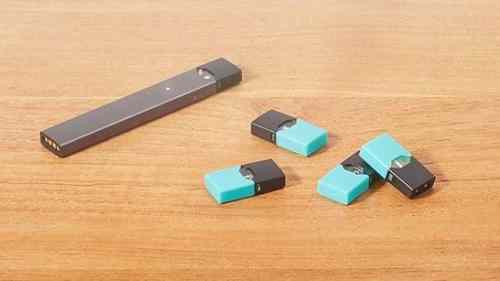There’s a new E-cigarrette children are taking in schools and it’s called a “juul”. It’s a popular e-cigarette system that looks a lot like a USB flash drive—you may have seen one in your teenager’s room and not given it any mind.

Based on Twitter and Instagram posts with the hashtag #doit4juul, students are “juuling” wherever, whenever—in school bathrooms, in libraries and under their desks in class. They’re getting away with it because the device is discreet, they can hide the “cloud” in a sleeve, and the vapor smells sweet and fruity, unlike cigarette smoke. Among teens, e-cigarettes are more popular than traditional cigarettes, and the Juul brand is currently king.

Who Is It Intended For?
Juul describes itself as “a mission-driven company seeking to eliminate cigarettes by providing a true alternative for adult smokers.” The company states on it’s website that Juul is “not appropriate or intended for youth, former smokers, or never smokers.” To purchase Juul products on the official website, JUULvapor.com, you must be 21 and go through an age verification process. In stores, you must be of the legal age to buy a tobacco or nicotine product in your state. But teens are finding ways to get them, such as using fake IDs, buying them on unregulated websites or knowing of a lax gas station attendant.
How Dangerous Is the Juul for Those Underage?
For adults, vaping is generally believed to be a healthier alternative to cigarettes because it doesn’t burn tobacco and release carcinogens. (Under FDA regulations, Juul “cannot and does not make any claims that its products are less harmful or safer than cigarettes.”)

But we shouldn’t consider any e-cigarette product “safe,” especially not for those underage. Teenage brains are still developing, so they’re uniquely vulnerable to addiction. Nicotine is very addictive, and exposure to nicotine in adolescence has been shown to have long-term impacts on brain development. It may affect teens’ behavior, concentration, memory and their ability to learn.
There are other health concerns for young people who vape. According to a study published in the American Journal of Respiratory and Critical Care, adolescents who use e-cigarettes are twice as likely to suffer respiratory symptoms such as a persistent cough, bronchitis, congestion and phlegm as those who don’t. And there’s some evidence that shows teen vapers are more likely to take up smoking tobacco cigarettes than non-vapers.
Also, it appears a lot of teenagers don’t know that vaping is wrong and dangerous. In a study sponsored by the National Institute on Drug Abuse, when high schoolers were asked what they believed was in the last product they vaped, most said “just flavoring.” As for the Juul, some teens are filling the pods with other substances, which is even more dangerous. They are not aware of what it contains and they don’t know it is injurious to their health. Most times, teenagers do these things just because their peers are doing it too.
How Can You Tell if Your Teen Is Juuling?
Signs of general e-cigarette use include increased thirst (the propylene glycol in the devices can cause dry mouth), a new sensitivity to caffeine and possible nosebleeds.
It’s important to start a conversation with your teens about e-cigarettes, whether you suspect they are using them on not. With the Juul, you might open with a general, nonthreatening question—“Hey, I just read about this thing. What have you heard about it?”—and see what they say.
Explain the serious health risks of e-cigarettes; remember phlegm, nosebleeds, lung problems, a messed-up brain, and addiction, just to name a handful. If your son or daughter is vaping, let them know that you do not approve, and work with them to replace the unhealthy behavior with a positive one. E-cigarettes contain more than fun, fruity flavors, and when teenagers use them, there may be lasting consequences.


